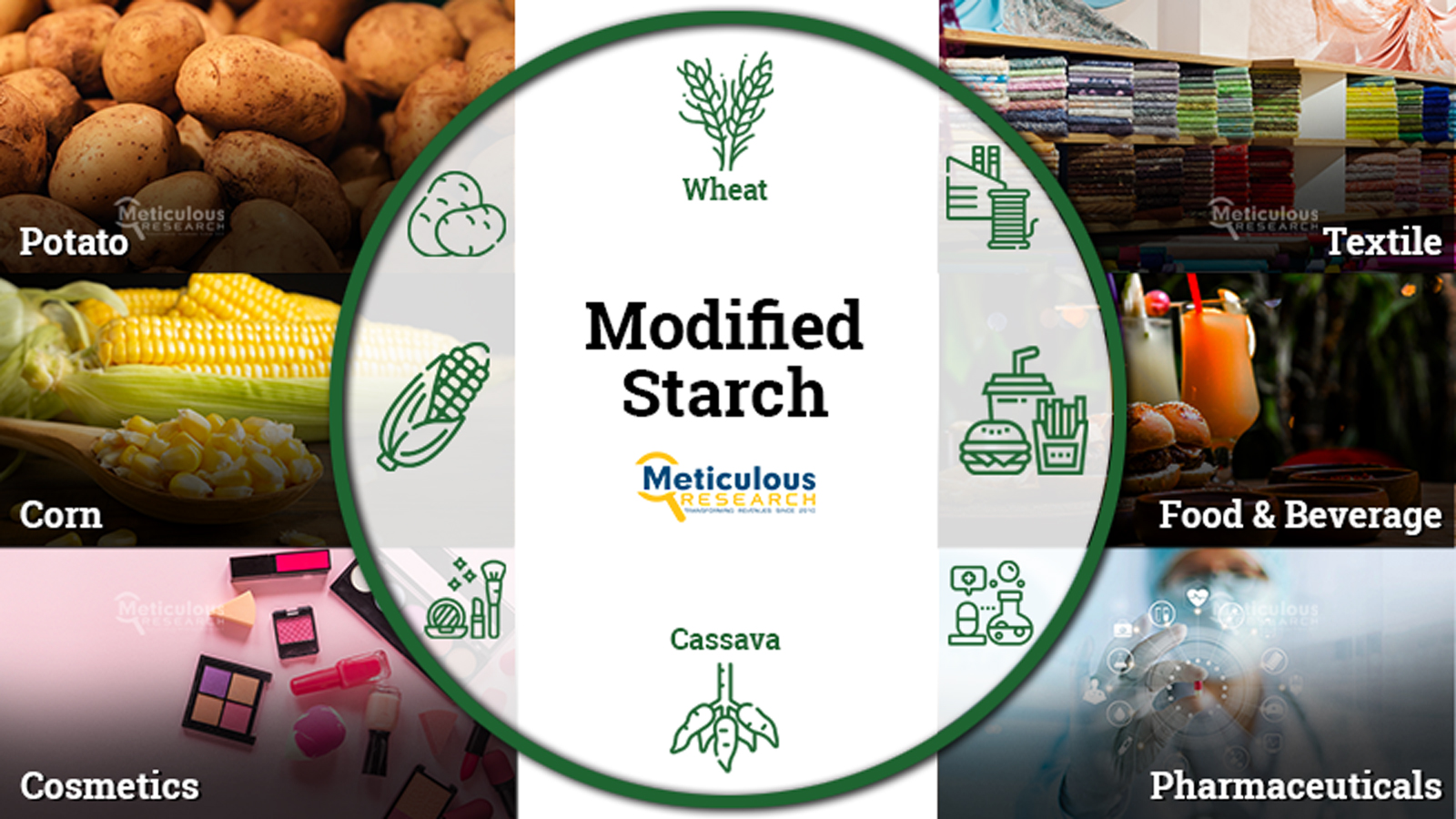
The Modified Starch Market was valued at $13.1 billion in 2023. This market is expected to reach $17.98 billion by 2031, from an estimated $13.57 billion in 2024, at a CAGR of 4.1% during the forecast period 2024-2031.
Overview of the Modified Starch Market
Modified starches play a crucial role in enhancing the quality of various food and non-food products. These starches are derived from native starches sourced from plant-based materials, including corn, cassava, potato, and wheat. Through different processing methods—physical, enzymatic, and chemical modifications—these starches acquire desirable characteristics such as improved stability, texture, viscosity, and shelf life. As a result, the modified starch market is expanding, with applications spanning several industries, including food and beverage, pharmaceuticals, animal nutrition, and cosmetics. The market includes diverse types of modified starches, such as acetylated, cross-linked, and hydrolyzed starches, tailored to meet the evolving needs of modern food processing and manufacturing sectors.
Download Sample Report Here @ https://www.meticulousresearch.com/download-sample-report/cp_id=2718
Key Types of Modified Starch
One of the most significant modified starches is acetylated distarch adipate, which possesses remarkable thickening capabilities due to its viscosity. This transparency and shiny appearance make it particularly attractive for food products. Acetylated distarch adipate serves multiple functions within the food industry, acting as a bulking agent, stabilizer, and thickener. It is commonly found in various products, including sauces (chili, soy, and tomato), ketchup, jams, jellies, desserts, fruit fillings, canned meats, pudding powders, drinking yogurt, whipped cream, sausages, meatballs, and fish balls. Beyond food, it is utilized in cosmetics, biodegradable plastics, and microencapsulation technologies, as well as in non-food applications such as automotive interiors, synthetic leather, and food packaging materials.
Rise of Clean-Label Functional Starches
The growing demand for clean-label functional starches reflects broader trends in consumer preferences, including an increase in the vegan population, a shift toward natural and sustainably sourced ingredients, and a heightened focus on fitness and health. These starches, typically derived from corn, tapioca, rice, and potato, are trusted ingredients with established applications across various food products. They contribute to the desired texture, stability, and process tolerance in items such as frozen meals, refrigerated dressings, and specialty formulations like dairy desserts and salad dressings. The demand for clean-label ingredients underscores the importance of transparency and sustainability in food production.
Functional Properties of Modified Starch
Modified starches are known for their versatility, making them invaluable in the food and beverage industry. They can be derived from native starch through physical, enzymatic, or chemical processes, which expand their range of applications. Key functional properties include thickening, gelling, stabilizing, solubility, stability, and emulsification. These properties make modified starch suitable for use as a thickener in various food products, including sauces, soups, and gravies. Their effectiveness in enhancing stability helps prevent separation, settling, and degradation, particularly in challenging environments, such as those that are acidic or exposed to high temperatures.
Ease of Incorporation in Food Formulations
The incorporation of modified starches into food formulations is relatively straightforward. These starches can be added during mixing, often dispersing easily in cold water before integration into the product. The versatility and ease of mixing with other ingredients allow manufacturers to achieve their desired outcomes efficiently. This ease of use is a significant factor driving the adoption of modified starches in the food and beverage industry, facilitating the creation of high-quality products without extensive processing requirements.
Applications in Processed Food Products
In the processed food industry, modified starches find applications across a wide range of product categories, including batters and breading, dairy and dessert products, soups and sauces, dressings, and confectionery. Their addition during processing provides numerous benefits, such as longer shelf life, improved texture, enhanced appearance, and superior taste. Additionally, modified starches contribute to low viscosity and high stability, enhanced freeze-thaw stability, improved binding properties, and resistance to granulation and gelatinization. These properties empower manufacturers to develop healthier food products while maintaining quality and consumer appeal.
Conclusion
The functional properties and expanding applications of modified starches are driving significant growth in the modified starch market. As industries continue to evolve and consumer preferences shift toward healthier, cleaner, and more sustainable products, modified starches will play an increasingly vital role in meeting these demands. Their versatility across multiple sectors—particularly in food and beverage—highlights their importance as essential ingredients for enhancing product quality, stability, and consumer satisfaction. As innovation continues to shape the modified starch market, it is clear that these ingredients will remain pivotal in the future of food processing and manufacturing.
Modified Starch Market Research Summary
| Particulars | Details |
| Number of Pages | 366 |
| Format | |
| Forecast Period | 2024–2031 |
| Base Year | 2023 |
| CAGR (Value) | 4.1% |
| Market Size (Value) | USD 17.98 Billion by 2031 |
| Market Size (Volume) | 28,655,308 Tons by 2031 |
| Segments Covered | By Product Type
By Raw Material
By Production Method
By Function
By Form
By End-use Industry
|
| Countries Covered | North America (U.S., Canada), Europe (Germany, U.K., France, Italy, Spain, Rest of Europe), Asia-Pacific (China, Japan, India, Australia, Rest of Asia-Pacific), Latin America (Brazil, Mexico, Argentina, Rest of Latin America), and Middle East & Africa |
| Key Companies | Cargill, Incorporated (U.S.), Ingredion Incorporated (U.S.), Archer-Daniels-Midland Company (U.S.), Roquette Frères (France), Tate & Lyle Plc (U.K.), AGRANA Beteiligungs-AG (Austria), Royal Avebe (Netherlands), Emsland-Stärke GmbH (Germany), Grain Processing Corporation (U.S.), Global Bio-chem Technology Group Company Limited (China), Asia Fructose Co., Ltd. (Thailand), Angel Starch and Foods Pvt. Ltd. (India), SMS Corporation Co., Ltd. (Thailand), Royal Ingredients Group B.V. (The Netherlands), and SPAC Starch Products Ltd. (India) Private Limited (India) |
About Meticulous Research®
Meticulous Research® is a leading provider of comprehensive market intelligence, offering actionable insights and analysis across various industries. Our reports empower businesses to make informed decisions, drive growth, and remain competitive in a rapidly evolving marketplace.
Contact:
Meticulous Market Research Pvt. Ltd.
1267 Willis St, Ste 200 Redding,
California, 96001, U.S.
USA: +1-646-781-8004
Europe : +44-203-868-8738
APAC: +91 744-7780008
Email- sales@meticulousresearch.com
Visit Our Website: https://www.meticulousresearch.com/
Connect with us on LinkedIn- https://www.linkedin.com/company/meticulous-research







